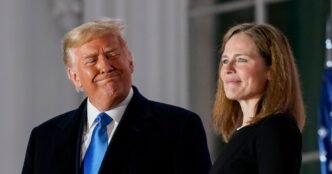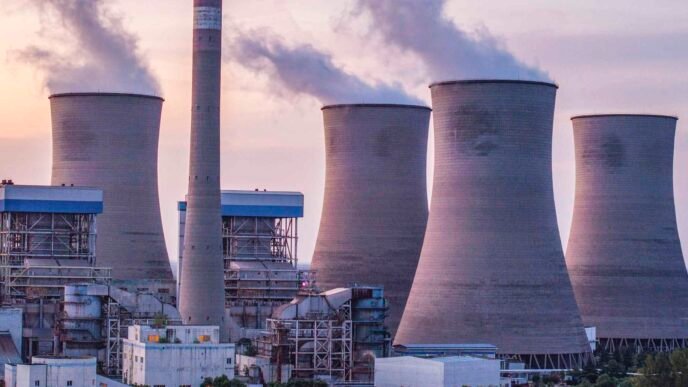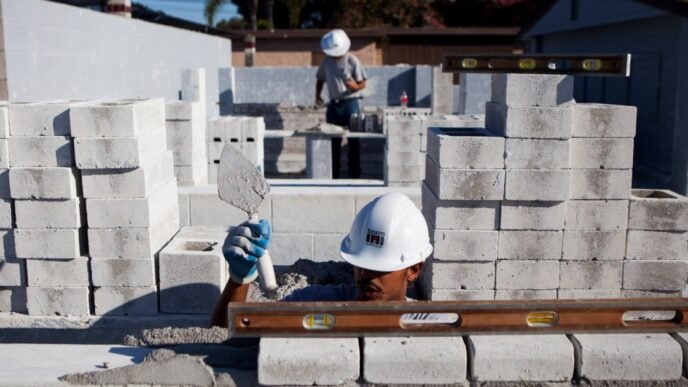WASHINGTON — President Donald Trump is signaling a new approach to selecting judges in his second term, departing from his first-term formula of younger up-and-comers, elite credentials and pedigrees in traditional conservative ideology and instead leaning toward unapologetically combative, MAGA-friendly nominees.
The president turned heads last week by launching a searing attack on Leonard Leo and the conservative legal network known as the Federalist Society, which played a major role in selecting and steering 234 Trump-nominated judges, including three Supreme Court justices, through Senate confirmation during his first term.
Trump’s transformation of the federal courts and the creation of 6-3 conservative Supreme Court majority, which led to the overturning of the landmark abortion rights case Roe v. Wade in 2022, was possibly his biggest achievement in his first term.
But Trump slammed Leo as a “sleazebag” in late May after a panel of judges, including one he appointed, blocked some of his tariffs.
“I am so disappointed in the Federalist Society because of the bad advice they gave me on numerous judicial nominations,” he wrote on Truth Social.
Leo, who declined an interview request, praised Trump’s first term judicial appointments, saying in a statement that they will be his “most important legacy.”
Of Trump’s early judicial nominees in his second term, much attention has been focused on his decision to tap Emil Bove, his former personal criminal defense lawyer and current Justice Department official, to serve on the Philadelphia-based 3rd U.S. Circuit Court of Appeals.
“What’s different about him is that MAGA world is very excited about him because it sees him as someone who has been ruthlessly implementing the White House’s wishes,” said Ed Whelan, a veteran conservative judicial nominations analyst who works at the Ethics and Public Policy Center.
The president’s early actions have raised warning signs among conservative lawyers who favor a nonpartisan judici.
“It’s potentially a watershed moment in the relationship between Trump and the traditional conservative legal movement,” said Gregg Nunziata, former chief nominations counsel to Senate Republicans who now leads the Society for the Rule of Law, a group of right-leaning lawyers that has been critical of Trump. “There are allies and advisers to the president who have been agitating for a different kind of judge — one more defined by loyalty to the president and advancing his agenda, rather than one more defined by conservative jurisprudence.”
Nunziata warned that the president is “turning his back on” his first-term legacy of prioritizing conservative jurisprudence.
Trump’s social media posts were welcomed by some conservatives who want a new approach to judicial nominations in his second term — including Mike Davis, another former Senate GOP chief counsel for nominations, who runs the conservative Article III Project advocacy group and offers his suggestions to the White House on judicial nominees.
Trump needs to avoid “typical FedSoc elitists” who were “too weak to speak out” on issues like what MAGA world perceives as lawfare against Trump during the Biden years, Davis said.
“We need to have evidence that these judicial nominees are going to be bold and fearless for the Constitution, and there were plenty of opportunities for them over the last five years to demonstrate that,” he added.
Jonathan Adler, a professor at Case Western Reserve University School of Law who mixes in Federalist Society circles, said some federal judges may have concerns about stepping down if they are not convinced Trump will replace them with someone they consider to be qualified.
Certain judges, Adler said, want to be succeeded by “someone that understands the judicial role, understands that their obligation is to follow the law and apply the law, as opposed to someone that is seen as a political hack and is going to rule in a particular way merely because that’s what their team is supposed to want.”
Whelan said he has heard a sitting judge express such concerns.
“I recently heard from a conservative judge who has decided not to take senior status because of concerns over who would be picked as his or her successor,” he said. He declined to name the judge.
GOP senators steer clear of Trump-Leo clash
During the first term, Leo played a key role in advising Trump on whom to pick. He helped come up with a list of potential Supreme Court nominees during the 2016 election, when some on the right were worried Trump would not pick a justice who was sufficiently conservative to replace Justice Antonin Scalia, who died earlier that year.
In Trump’s second-term, the deputy White House counsel for nominations, Steve Kenny, has daily oversight of judicial nominations with input from chief of staff Susie Wiles, White House counsel David Warrington and Trump himself, among others. Like Davis, Kenny previously worked for Sen. Chuck Grassley, R-Iowa, on the Senate Judici Committee.
“In choosing these judges, we are looking for judges who are constitutionalists, who won’t be judicial activists on the bench,” a senior White House official said. The administration is looking for judges whose judicial philosophy is similar to conservative Supreme Court justices such as Samuel Alito and Clarence Thomas, the official added.
Both are seen within MAGA world as more aligned with Trump than his own appointees to the court: Justices Neil Gorsuch, Brett Kavanaugh and Amy Coney Barrett.
Despite the alliance with Leo delivering achievements that many Senate Republicans take pride in, few were willing to jump to his defense in the wake of Trump’s personal attack.
“I’m not going to get involved in those personality conflicts,” said Sen. John Cornyn, R-Texas, a senior member of the Judici Committee.
Sen. John Kennedy, R-La., another Judici Committee member, pleaded the Fifth: “That’s between Leonard and the president.”
But, he added, “I like the Federalist Society.”
Grassley praised Trump’s initial slate of nominees.
“Republicans remain laser-focused on putting strong conservatives on the federal bench,” he said. “President Trump’s first five judicial nominees, who all came before the Judici Committee this week, are high-caliber legal minds who will faithfully defend the Constitution and serve the American people well.”
Despite the first-term success, there were already indications once Trump was re-elected that his second-term approach to judicial nominations would differ. Leo is no longer advising Trump, and both the president and his allies have been sharply critical of judges who have ruled against the administration in its early months over its aggressive use of executive power.
Barrett has been one target, as have some lower court judges.
“Federalist Society lawyers are very bright. They’re very intellectual, kind of the academic side of the law. This Trump White House is looking for more practical judges,” said a senior Republican lawyer close to the White House.
“A second element is there are some decisions that have been made by Amy Coney Barrett, in particular, that really disappointed the Trump administration, and Trump people more broadly, and that has filtered down to some of these lower court decisions,” the lawyer added.
For Democrats, Trump’s public break with the Federalist Society — along with another move to refuse to cooperate with the American Bar Association, which traditionally provides recommendations on judicial nominees — are part of the same trend.
“They don’t want anyone looking over the shoulders of nominees to find out what they believe, what they’ve said and what they’ve done,” Sen. Dick Durbin, D-Ill., ranking member of the Senate Judici Committee, said Wednesday during the first hearing for Trump’s new wave of nominees.
‘The Trump 1.0 Federalist Society mode’
So far, Trump has announced two nominees to the influential federal appeals courts, as well as nine district court nominees. In addition to Bove, the other appeals court nominee is Whitney Hermandorfer, who has been tapped for a seat on the Cincinnati-based 6th U.S. Circuit Court of Appeals.
While Bove is not viewed as the type of nominee Leo might suggest, Hermandorfer is seen as a traditional Federalist Society pick. She served as a law clerk for Barrett and Alito, as well as for Kavanaugh when he was an appeals court judge. Hermandorfer has also been involved in some culture war litigation while serving under Tennessee Attorney General Jonathan Skrmetti.
She is “very much in the Trump 1.0 Federalist Society mode,” said Russell Wheeler, a scholar at the nonpartisan Brookings Institution who tracks judicial nominations.
Five of Trump’s district court nominees are from Florida, and four are from Missouri.
Hermandorfer, joined by the Missouri nominees. appeared at the confirmation hearing Wednesday where she said her job would not be to do the president’s bidding.
“That would not be my role. My role would be to carry out my oath,” she said. Hermandorfer called the Federalist Society, of which she is a member, a “wonderful place” to discuss issues with other lawyers.
According to the federal judici, there are 49 pending vacancies, with only three of them on the appeals courts. Another three have announced plans to step down.
The Republican lawyer close to the White House said it is a little early to know how different Trump’s second-term picks will be from the first because the president got off to a slow start in nominating his first batch of judges.
Trump may struggle to match the numbers of his first term, in part because this time around there are not as many vacancies as there were in 2017. Then, Trump benefited from a Republican Senate that blocked many of President Barack Obama’s picks, including his nominee to replace Scalia, Merrick Garland.
Legal activists tend to focus more on federal appeals court nominees than district court nominees because they have more power to change the law and are often more likely to be tipped for potential slots on the Supreme Court.
There are currently 24 Republican-appointed appeals court judges in total who are eligible for retirement, according to Wheeler. Generally, judges are more likely to step down when a president of the same party who appointed them is in office.
‘Activist judges with an agenda’
Even if Trump wants to depart from the Leo playbook, he will find it difficult to find qualified conservative lawyers who do not have some links with the Federalist Society, Whelan said.
“If you are looking for talented lawyers with the sort of experience that would make them good judges, most of the people you are looking at are going to be Federalist Society types,” he added.
Kenny, for example, who holds daily oversight over nominations at the White House, “is definitely a proud member of the Federalist Society,” the lawyer said. “But he’s also going to follow the administration’s lead on the kinds of judges they want.”
Nunziata said it’s up to GOP senators to push back on nominees like Bove, warning that acquiescing would send a signal to Trump that he has a “free hand” to nominate more individuals like him, including to a possible Supreme Court vacancy.
“I hope there will be pushback. Time will tell,” he said, citing former Senate Republican leader Mitch McConnell’s key role in steering Trump’s first-term judicial nominees. “I would expect him to be alarmed by this turn and to fight against it with his remaining time in the Senate.”
McConnell’s office declined to comment.
Democrats say that with nominees like Bove, Trump is making it more explicit that he simply wants loyalists.
“He’s putting in all the people that will support him, or have a relationship to him,” Sen. Mazie Hirono, D-Hawaii, said. “That’s what it’s all about for the president. … He just wants people who will support what he wants.”
But when asked if she believes Republicans will stand up to some of Trump’s judicial nominees, Hirono responded wryly.
“Of course not,” she said.













